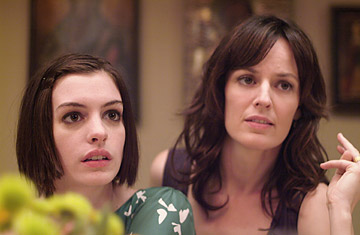
Anne Hathaway, left, and Rosemarie DeWitt star in Jonathan Demme's Rachel Getting Married
The question before us is: When exactly did Jonathan Demme lose his sense of humor? Back in the '70s and '80s he was the best — or at any rate the most promising — young American director. He had a taste for American eccentrics, for the vagaries of life on the American road, and a talent that extended beyond fictional features to concert films and documentaries. In their day, Citizen's Band, Melvin and Howard, Something Wild and Married to the Mob had about them a sort of humane nuttiness, an ability to catch the fun and shrewdness of ordinary, if hard-pressed, folks without ever patronizing their goofiness. He was the most pleasure-loving and pleasure-giving of directors.
His greatest hit, 1991's The Silence of the Lambs, was his high point — black and scary, but featuring a cannibal so smart and sardonic that you had no problem imagining Jodie Foster sort of falling for him — or at least having a wary dinner with him. This was Demme in from the fringe, operating in the mainstream — and about to lose his way with the ponderous, if well-meant, AIDS drama, Philadelphia. After that it has all been pomp and boredom — Beloved, The Manchurian Candidate, a documentary about Jimmy Carter, for heaven's sake.
Demme's new film, Rachel Getting Married, is arguably an attempt on the part of the director to wend his way back to his roots. It's a small-scale comedy, written by Jenny Lumet (daughter of Sidney Lumet), in which a smugly PC family gathers to celebrate the wedding of their perfectly beautiful, perfectly balanced daughter, played by Rosemarie DeWitt. This is not just a wedding, however; it is also a sociopolitical statement, for the groom is a handsome black man, scion of a family that is far more conventional and bourgeois than the bride's family, and especially the bride's sister, Kym (Anne Hathaway). Rachel's wedding is Kym's first, brief venture back into the real world after a long stint in rehab, and she's the weekend's wild card — estranged from her family, given to solipsism, unpleasant truth-telling that may not be truthful at all, and bad (or at least embarrassing) behavior, which tends to be more cringe-inducing than liberating.
The idea, according to a director's statement by Demme, is to pay tribute to Robert Altman's method — hand-held cameras, casual framing, a sense that the dialogue is more overheard than consciously crafted. But the result is a mess. Kym, in Hathaway's unsympathetic performance, is an annoyingly sour observer of the proceedings, a time bomb everyone hopes will not explode before the marriage is completed. Her father, played by Bill Irwin, is a pious twit, sublimely unaware of how thin and weak his family's values are when put even to the mild test this wedding's kerfuffle presents. It is nice to see Debra Winger as his ex-wife — she's been away from the movies too long — but she mostly lurks on the fringes of the action and is not permitted to develop an arresting character. But then, no one is. Everyone just behaves in what is meant to be a naturalistic manner, which occasionally worked for Altman but just as often left audiences adrift. The trouble with this kind of filmmaking is that we are encouraged to feel superior to the characters we are watching, but are not given any special justification for our misanthropy. There was nearly always something ugly, careless and unfelt about the way Altman struck his superior poses. An imitation of that style is an affront no one needs.
Click here to see Richard Schickel's top 10 films from the 85-year history of Warner Bros. studio.
